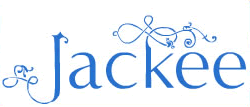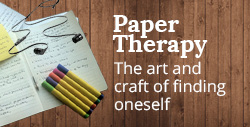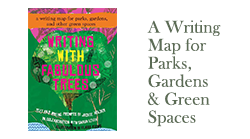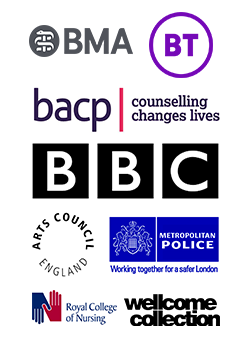Writing
Thursday, April 2nd, 2015
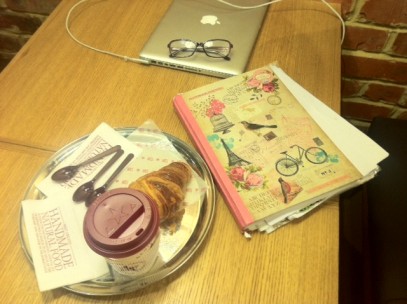
You’d love to write or start a blog, draft the content for your website or even write a book someday? But perhaps you just can’t seem to find your groove? Well nothing happens without doing the work, as Steven Pressfield would say, rolling up your sleeves and getting on with the practice. With more than four books published I’ve had over twenty years of writing practice under my belt. So today I’m sharing the five things I do on a regular basis that are guaranteed to get me to the page and to keep me there.
Remember these are my personal tips and whilst some might work for you others might not. Writers and creative’s (yes that does include you) are as different as we are the similar. What works for you are bound to be a No, No for someone else? So I invite you to borrow some or all of the tips below and add ones that make more sense for you. Your job, find what works and do more of it.
Writing Tip Number 1
Walk often and as regularly as you can. That’s right take a walk (ideally first thing in your day as often as you can). Walking clears your head and stimulates creative ideas. I’ve never returned from a walk thinking, ‘Gosh I wish I hadn’t gone for a walk,’ in fact more than not the opposite happens. As soon as I’m back home or arriving at my destination without fail I always find myself heading for the pages of my notebook to get my ideas down as fast as I can.
Writing Tip Number 2
Write as early as you can in the day (after or before your walk. I know this may take a little bit of organising). I know this tip might not work for everyone especially if you like your sleep but this is one that really does it for me. I’m someone whose easily distracted, so the moment I open my laptop the vices of social media lure me in and within nano seconds I’m hooked and the writing goes from centre stage to back stage. Writing first thing in the morning guarantees fewer distractions and means that before the day is underway I’ve met my writing objectives for the day. Now how good is that?
Writing Tip Number 3
Writing first thing not only sets up my day it also boosts my confidence and well being. Now when I say writing I don’t mean a perfectly published piece ready to be published. No, what I’m talking about here is anything from your to do list, a journal entry to the first draft of a blog post, a handout for training, a work report or a chapter for a new book. By the way, I consider all of the above and more as writing. It is not a matter of what you write. It matters most that you write. Summed up perfectly by writer Dorothy West, ‘I love writing. I hate not having written.’
Writing Tip Number 4
I never turn up to write an article and expect it to come out polished first time. In fact most articles start out pretty much the way writer Anne Lamott describes them as, ‘shitty first drafts.’ When writing a first draft concentrate on laying down the bones of your idea then go back and add the meat. I do this sometimes a good few times before I hit send. What you are doing it getting into the habit to build and refine, build and refine. I visualise building up from this base line and it turns out to be a very satisfying feeling.
Confidence grows from knowing that you don’t have to be perfect the first time, the second or even the third. Actually you need never be perfect. That’s the reality there will always be more to edit on anything you write. Your job is to know when good enough is enough, which is often for you recovering perfectionists a good few steps before you considered it was good enough in the first place to go public. Cut your self some slack. Think completion not perfection. As one of my former coaches, Lynda Field, wisely put it, ‘Confidence comes after the act not before.’
Writing Tip Number 5
Less really is more. This has been one of my steepest learning curve balls of my writing life. I prided myself on providing both quantity and quality. On the surface these were great values to have but they carried a shadow side. They weighed me down with the levels and degrees of high standards and expectations, which were rarely met, and which resulted in me really holding myself back.
The breakthrough came with the realisation that I don’t need to cram everything into one post, article, feature or book. Have you seen the attention span of modern society? It isn’t long. Instead it’s wise to spread your content over a series of posts. Instead of writing one book ask yourself is there enough content for two or even three? Think of how impressive four posts look compared to one?
These are my five favourite tips that support and grow my writing life.
- Which tips do you relate to?
- What tips would you add to your own lists that are more on your wavelength?
If removing distractions is on your list so you can get on with the business of writing then why not join me at the end of May 2015 (May 29th-June 5th 2015) for the second annual Inside Out Writers Retreat in Greece? In the idyllic surroundings of sea and mountains you’ll have plenty of time and space to write, learn and craft your writing during scheduled classes with me, gain valuable feedback on your writing and generate publishable content.
Click here for more details:
No Comments
Thursday, March 5th, 2015

To have greater self-awareness or understanding means to have a better grasp of reality. - Dalai Lama
When I was growing up I had a strong feeling even though I could not put words to it back then that emotional intelligence (mu common sense and intuition) served me much more effectively than the highly regarded cognitive IQ. As a young child I saw things in my family and my environment that I just knew weren’t right and I spoke out against it. It didn’t always go down well.
My parents were delighted when I received a place at a sought after girls grammar school in our local area. But my school, which had a strong focus on academia only served to stifle my creativity and at the age of sixteen I failed most of my GCSE’s even though I loved learning and was a model student.
That was a pivotal moment in my young life. Faced with the option of staying on at school and the reality of being forced down the route of a secretarial course or re-sitting my GCSE’s I made a very conscious and clear decision I’ve never regretted. I set my sights on college, leaving behind five years of solid friendship and a comfort zone of familiarity for the unknown territory of college. I knew in my bones that I needed a new challenge, that staying on at school would not be right for me even though I was going against the norm of the path girls followed at our school.
At college enrollment I came head to head with the Head of A’ Levels with my mother in tow (parents very rarely turned up for their children to enroll at college). He took one look at me, told me I could re-sit some of my GCSE’s, add in some new one’s and start my A’ Levels all at the same time. The combination of a stretch and his clear belief in me was all I needed to extend myself into a new place of growth and development. Within the space of two years I had five GCSE’s under my belt, achieved two A’ Level’s and once I had achieved all of those left to attend a new college where I added two more A’ Levels to my list.
But this story is not about the qualifications per se but about my ability to draw on my own self-awareness at a young age and knowing and trusting what was right for me and, what things went against the values I was slowly forming from my life experiences and view of the world. It was the beginning of the roots of the formation of my own emotional intelligence made famous in the early 1990’s by the then science journalist now psychologist Daniel Goleman.
Turns out that IQ was not the greatest indicator of personal and leadership success or job performance. Research indicated around that time was that IQ contributed 25 per cent to career success. Turns out that IQ on it’s own was not enough and emotional intelligence (EQ – Emotional Quotient) had a far greater impact on the realisation of real authentic.
Even though Goleman is the name most strongly associated with the introduction of emotional intelligence to the masses much of the work around emotional intelligence was previously pioneered by researchers and scientists like Peter Salovey and John D. Mayer Richard Boyatzis, Paul Brown and Gardner’s work on Multiple Intelligences. But it was Goleman’s book ‘Emotional Intelligence’ (1995) that caught the attention of the masses.
Over the years through my own personal practice I discovered through the combination of journal writing and reflective writing how both methods which I use to explore my work and my personal life have been strong advocates of strengthening and cultivating emotional intelligence capabilities and are both approaches that can be used for individuals to personally take responsibility for developing and developing strong foundations in emotional intelligence. The practice of conscious writing and reflection relates strongly to the six areas often identified as the key indicators of the formation of emotional intelligence.
Goleman’s four main areas of emotional intelligence are:
- Self-Awareness
- Awareness of self and others
- Social skills
- Self-Management
Here are some of the ways in which I believe journaling and reflective writing connects with the four development areas of emotional intelligence.
Self-Awareness
Journaling and reflective writing allows you to be aware of your own thoughts and feelings and be in a better position to manage and handle stress. It is a safe, self-directed space to express and unravel emotions and helps determine when and how to express emotions beyond journaling and reflective writing. Goleman believes all change start here with self-awareness. Journaling or writing reflectively gives you a higher degree of self-awareness and understanding of your strengths and weaknesses.
Ways to connect your journal and reflective writing to EQ:
- Write about your feelings in your journal or reflective notes.
- Are your feelings congruent with your reactions and behaviours?
- Make a list of your strengths and limitations.
- How can you build on your strengths?
Awareness of Self and Others
By journaling and reflecting on your work, how you do things, your relationships with others you are laying them down in writing for examination and exploration. Your journal and reflective writing notes are a way of you individually taking responsibility for understanding how your emotions and feelings impact others and understanding how others maybe emotionally feeling.
Before making a rash decision or not thought through decision you can use your writing to slow you down and listen to your own wise counsel. This helps to cultivate better decision-making skills and cultivate healthier relationships with others. It’s a healthy way of processing and releasing conflicts, frustrations and the difficult and more complex dynamics of relationships with others.
Ways to connect your journal and reflective writing to EQ:
- Make a list of all your different roles at work and in your personal life.
- How do you feel about each role?
- What works?
- What doesn’t work?
- What would you like to change
Social Skills
Social skills are about developing empathy, your understanding of the organizational politics and understanding the needs of colleagues, staff, clients and customers.
Ways to connect your journal and reflective writing to EQ:
- Draw up an inventory of your main relationships at home and at work?
- How well do you listen to each person on your list?
- How would you rate the quality of your interactions and communication with each person on your list?
- What is my body language like when you’re communicating with each individual?
- How would you like to improve or progress your relationship with each person on your list?
- What would this require for you to do more or to do differently?
- How willing are you to do this?
Self-Management
Journaling and writing reflective notes is a form of self-organizing on the page. The practice of intentional writing in this way can help identify what you think, notice what you feel and decide on how you will respond. It’s also about your response to others, how you work flexibly with others and how you maintain positivity.
- When was the last time you had an impulsive emotional reaction?
- What was the impact?
- If the impact was negative – What would you do differently next time?
- If the impact was positive – What would you do more of next time?
- If the impact made a difference – What would stay the same?
I have over twenty years of journaling under my belt and a long history of reflective practice. Emotional intelligence is an area of personal and professional development you can take personal responsibility for at very little cost that has huge rewards. The leaders of the future (in all fields and professions) need to be fit for purpose. It is no longer enough to rely solely on your cognitive expertise and knowledge.
A study in the 1950’s of 80 Ph.D.’s in science who underwent a series of personality tests, IQ tests, and interviews when they were graduate students at Berkeley. Forty years later, when they were in their early seventies, they were tracked down and estimates were made of their success based on resumes, evaluations by experts in their own fields, and sources like American Men and Women of Science. It turned out that social and emotional abilities were four times more important than IQ in determining professional success and prestige.
- How can you ensure your IQ is balanced with your EQ and that they work in partnership and collaboration?
Journal and reflective writing can be boosted hugely by investing in other learning modalities to build on your EQ capabilities. Why not try one of these free on line EQ courses to find out more about your EQ type. Become curious about your feedback. Ask yourself questions that will support you to build on the findings. It is not the whole truth. Everyone has the potential to grow and shift.
Free EQ Tests
University Of Warwick
http://www2.warwick.ac.uk/services/ldc/courses/sdl/the_practical_eq_emotional_
intelligence_test_-_2-10-12.pdf
Institute For Human Potential
http://www.ihhp.com/free-eq-quiz/
MEIT Free EI Test
http://www.maetrix.com.au/meit/eitest.html
Central Test
http://www.centraltest.com/ct_us/article-emotionnal-intelligence.php
Have fun with it all. If you would like to experience a fun, experiential journal writing workshop then join me next Wednesday March 11th at the Paper Therapy: Writing To Grow and Thrive event at 7pm (Psychologies Magazine and Now Live Events)
More details here:
http://www.nowliveevents.org/events/
https://psychologies.co.uk/paper-therapy-writing-grow-and-thrive
No Comments
Friday, January 2nd, 2015

Photo of Einstein’s Office
Welcome to the first of my 5 part mini series on – What You Need in 2015 is not more time but more energy.
What is the number one commodity you believe will help give you the success you deserve in 2015 to be productive and live a more meaningful life? What if I told you that what you need more of in 2015 is not more time but more energy.
Time management courses are a waste of time if they don’t focus on this one often missing criteria – energy. Increasing the amount of energy you have access to as you go about your daily activities will transform your relationship with time.
On New Years Eve I sat and reviewed the goals I had planned the same time last year. It was very affirming ticking things off the list and recognising how many of the items on my list had actually manifested. Even better were the unexpected surprises and achievements, things that happened that were far better than I had intended for myself. Like the award for an article I wrote, the wonderful partnerships and collaborations with people I had not factored in and the connections I could not have planned to make happen even if I had tried. But still there was a nagging feeling I couldn’t shake off as I worked down my list. I couldn’t shake off the feeling that several items on the list could have been realised if I had not more time but more energy.
When I first came into contact with coaching in the late 1980’s one of the first coaching tools I was introduced to was the principle of eliminating your tolerations. Tolerations referred to people, objects, habits or practices in your day-to-day life that either slowed you down or drained your energy.
After all energy is one of your most valuable commodities. According to Tony Schwartz, CEO of the energy project whose work I have found really helpful it is best to take on the most important and difficult tasks when we have the most energy. But most of us never get to this point because either we don’t have the time or the energy even when time becomes available.
In my case when I reflected on the tolerations that resulted in a continual rapid loss of energy throughout the year I identified an un-healthy personal relationship dynamic, episodes of unhealthy eating habits, an embroilment in a lengthy, toxic drama as a named trustee on a friends estate that involved multiple, difficult and antagonistic relationships that had drained the life force out of me. To be blunt in 2014 I had experienced a complete zap of my energy both psychologically, emotionally, physically and spiritually so it was remarkable that I had achieved anything at all.
But despite all of the above I had achieved and I was astute enough to recognise that even so there was a considerable cost to allowing certain dynamics to continue to play out in my life that was contributing to a significant withdrawal of energy that I could have been putting to much better use.
This five part mini series will help you identify the things that drain your energy levels, put in place activities, systems and people who top up your energy levels, explore how to change your relationship and perspective with time and discover the projects and activities you want to focus on in 2015 so you can use your energy more resourcefully and strategically.
We’ll start today by looking at and working on eliminating your tolerations.
Make a list of the main areas of your life where you would like to eliminate your major and minor tolerations. Here are some suggested categories to get you started.
- Relationships
- Home environment
- Nutrition & Eating Habits
- Unhealthy habits and practices
Think about areas of your life you ignore or feel frustrated about (the piles of paper in my office), the people who when they come to mind or you see or hear their name called or their name pops up on your phone, actually dips your energy (relationships), items that are faulty or don’t work (home or work environment), habits and practices that are depleting (health and well-being).
Next make a list of all of the tolerations you are putting up with under each of the categories. These could be big (a relationship) to smaller items like the broken oven door.
Now decide on the first small step you will take to reduce or completely get rid of the negative or draining impact of each of the tolerations on your list. Remember it may take several small steps before the toleration is fully eliminated.
It’s important to write the step down and an intended date of when you will have completed the action. This does not need to be the actual date you complete the action on but a date for when you would like to have the action completed by. We’re more likely to complete a task when it’s scheduled in.
Getting rid of your tolerations over a period of time is one of the first steps in harmonising your goal setting. You’ll find as you get stuck in that you’ll experience a satisfying release of stuck energy.
Consider this as essential work of cleaning up your roots first and laying down healthy foundations as a natural way of holistically increasing your energy levels. Think about how much of your energy and time is consumed looking for things, compensating for things not working properly and absorbing the negativity of relationships that have an unproductive impact on your performance and productivity. By reducing the number of tolerations playing out in your life you’ll have more energy available to focus on your goals and aspirations for 2015.
Tomorrow we’ll look at once you’ve generated more energy what and how you will focus it so your new found energy works best for you.
No Comments
Wednesday, December 31st, 2014

Yesterday I received a great email from a reader who asked me the following two questions:
Question 1
How often do you recommend journaling? I have written in journals in the past but felt my writings were becoming mundane especially if I wrote daily when living a life that – well – wasn’t very eventful!
Question 2
I created a blog about two years ago and have had some fairly successful posts. Readers have encouraged me to write more. My dilemma is similar to my journaling one – What do I write about? I am always waiting for an inspirational event but I fear losing readers in the time lapse.
It was the kind of email I would get out of bed at 4am to answer. Luckily I clocked it at a decent hour to get up and immediately wrote a response. As I wrote my response I felt a bit like the poet Rainer Marie Rilke writing in the book Letters To A Young Poet who seeks his wise counsel. I had no idea of the age of my reader but the advice is applicable to all ages.
I was so inspired by these two questions that it felt right to turn this into a blog post and share with a wider audience. This is a common challenge for many people and with the new year only hours away I’ll shed some light on how to rise above this journaling challenge in the new year. So here goes.
How often to write in your journal is debatable and not fixed
There is no right or wrong way to keep a journal. Everyone will have their own journaling relationship and my journal writing habits have varied over the years. Overall I write in my journal at least five times a week. I have been doing so for over twenty-five years and it is now a fully ingrained habit. Trust your own rhythm and flow. If it’s weekly then allow that to become your rhythm.
Benefits of Journaling
I feel undone when I don’t write in my journal. It helps me to think better, clarify my thoughts and process ideas, work and writing projects. It’s a way I manage my stress and anxiety that I recently began suffering from. There’s so much research on the benefits of journal writing just check out my book 49 Ways To Write Yourself Well http://www.amazon.co.uk/s/ref=nb_sb_noss_1/278-5472456-6835842?url=search-alias%3Daps&field-keywords=49%20Ways%20To%20Write%20Yourself%20Well
It’s packed with journal writing prompts and exercises of things to write about.
What To Write About
My journal jottings are a combination of personal feelings and emotions, reflections on experiences and activities that happen during my day or the week, shopping and to do lists and is a place where I write drafts for projects, articles you name it. I also write down quotes and poems that inspire me as I come across them in my journal and I also stick down images and what I refer to as Visual writing prompts http://www.jackeeholder.com/writers/visual-writing-prompts/
I write and publish loads of articles and blog posts about journaling on the internet and I love it. It’s become my niche simply by following my passion and keen interest in journaling. I’m curious about what it is you love or have a deep interest in?
Keep writing and the writing will lead you. It’s like going on a walk. You never know what you will discover. Writing is both a mystery and an oracle of revelation.
Anyway I bet you don’t lead an uneventful life. Your writing will uncover much that is hidden deep inside you and if your life really does feel uneventful writing will help you discover what would give your life more sparkle. I write a lot about the ordinary moments in life and not just about the drama’s and the heart aches.
My journal is literally a workbook of my inner and outer life all in one place. It is so much more than who people think I am and how I present and share myself. It’s a documentation of the real me where I am the author.
Different Types Of Journals
In the past I’ve kept a separate journal for my business as a writer and a coach and that worked really well. Only problem was my bag got too heavy with carrying around too many books so I retreated back to one journal! I’m finally appreciating the vast possibilities and creative digital journaling apps that are available too. I find writing in different mediums stimulating.
One Word Journal Entries
Sometimes life is way too stressful and I can only manage one word or a few sentences in my journal. These to me are still valid and valuable journal entries that I often go back to and flesh out at a later date. So much can be captured and expressed in one word.
Writing Prompts
I use writing prompts a lot as a way of coaxing my inner writer onto the page. I often feel before I start writing that I don’t have anything to say but I am always surprised and amazed by what emerges once I get going with a writing prompt.
To help bypass this challenge of what to write about I created the Journal Journey Guidebook that contains over 100 journaling prompts and quotes. You’ll always have things to write about now.
Download your free copy here
http://www.jackeeholder.com/wpcontent/uploads/2014/01/
Journal_Journey_Guidebook_January_2014_small_version.pdf
The New Year is a great time to recharge and refresh your journal writing so I created a list of New Year writing prompts to kick start your journal writing in 2015. Here’s the link http://www.jackeeholder.com/coaching/handmade-new-year-journal-prompts/
You can also listen to this podcast interview where I am a featured guest on the panel discussion on Looking Back and Looking Forward and sign up for the Journal Kit to look back and look forward in your journal for the New Year
https://iajworg.leadpages.net/lblf-journaling-kit/
Blogging
I think it is great that you’ve been receiving positive comments on your blog. I decided to turn off the comments on my blog and focus on producing content. Again I am amazed at how many people do read what I write as they email me at my website.
To have people comment and encourage you at this early stage is a great affirmation and sign to keep producing. I don’t think we ever know what blogs will move our readers. I believe ultimately our job, as the writer is to simply show up. But I have noticed how fulfilling I find it when I finish and upload a post how that builds my self -esteem and inner confidence as a writer and this is where the juice lies. Explore these questions in your journal:
- How do you feel about the process of writing?
- What inspires you to write?
- What topics do people comment on most on your blog?
- If you were given an exclusive book deal to write a book what would you write about?
- Set a timer for 5 minutes and make a list of every and anything you’d love to write about.
Journal Everywhere
I do take my journal everywhere so I am never lost for things to write about. On social occasions I write on notes on my iphone. I write on public transport, parked up in my car, waiting in-between appointments. Nowhere is off limits for writing. I wrote my response to you parked up in my car as I was waiting for my favourite café to open this morning. When I write in café’s it doesn’t feel like I’m working and my inner critic goes to sleep with boredom.
- Where do you like to write?
- Where else could you be using as a writing space?
- What inspires you?
Nearly finished…
Recommended Journal Writing Books
I have hundreds of writing books in my book collection that have become my writing mentors. Here are a few of my recommendations http://www.jackeeholder.com/coaching/gift-someone-a-blank-journal-this-christmas/
I would recommend adding two or three from the list to your personal collection that you can turn to for writing inspiration and motivation when you feel stuck. I find the books on the list so helpful.
Sexy, Sacred Journal Writing
Finally why not join me for my six-week online journal writing class
http://www.jackeeholder.com/events/sexy-sacred-journal-writing-online-course/where you will dive into the wonderful and rich world of journal writing and getting to know yourself intimately and creatively.
I send out three lessons each week, which you can complete at your own pace. There is no hurry with this class. Just move along at your own pace.
Every Friday I share a video interview with a journal expert. Feedback from this video series has been excellent. You are free to keep the experience on the course private or you can share as you go through the course with other on our course discussion forum.
Each lesson gives you a series of prompts and activities to explore in your journal. This course will also inspire and contribute to other things you want to write
We have a 2-4-1 offer at the moment so you can also gift a friend a place on the course. The course starts on January 5th so there’s still time to sign up.
Would be really lovely to have you join us.
Hope this all helps. You seem ripe for a year of unravelling on the pages of your journal.
Sending you seasons well writing wishes.
Warmly.
Jackee
I hope my response also inspires you with your journaling and blogging in the new year.
We’d also love your company on Sexy, Sacred Journal Writing course.
Treat yourself and a friend to a surprise new year gift in our special 2-4-1 offer of £57
http://www.jackeeholder.com/events/sexy-sacred-journal-writing-online-course/
No Comments
Sunday, December 28th, 2014
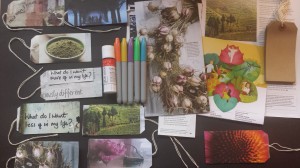
Photo credit: Jackee Holder 2014
How about some paper therapy to take you into the new year?
Make your own hand made journal writing prompts or inspirational writing quotes to get you started and to keep going so you won’t run out of things to write about in the new year.
You will need:
Photo credit Jackee Holder 2014
- Packet of brown or coloured luggage tags (12-24 individual tags)
- Glue stuck and pair of scissors
- Print off the list of writing prompts or inspirational writing quotes at the bottom of these instructions.
- Pen if you are going to hand write the journal prompts or quotes
How it works:
- Leaf through your magazines and tear out pages with images, pictures and words that catch your attention.
- You might also like to tear out pages with colour as these make contrasting backdrops for some of your images.
- Bear in mind that one side of the tag will include the words of the journal prompt or quote and the other side will focus more on the image.
- If there are images you like photocopying the original and keeping the original as a master copy.
- Collage your luggage tags using the images and words collected from your magazines.
- Hand write or paste each of the writing prompts or quoted on one side of the luggage tag. Use a permanent pen or marker like a Sharpie if hand writing your prompts.
- If you are gifting your journal prompts bundle them together with string or ribbon.
- Alternatively place each journal prompt or quote in-between the pages of a blank journal. Keep them in an envelope or a special box.
Hope you’ve noticed these also make great personalized gift tags!
Journal Quotes
- What I really, really want?
- Things would have been much better had I …
- The thing that stood out from today?
- What I didn’t do that I could have done?
- The feelings and emotions I am noticing …
- If there was nothing holding me back the things I would be trying out, doing or saying would be …
- When I was a child I dreamed of becoming a …
- 10 things I’ve learned from my life to date?
- The things I know I’m not writing about are …
- A time in my life when I was really powerful? How could I transfer my way of being from that moment into now?
- What advice would your inner mentor give you right now?
- Describe your year twelve months on from today.
- The holiest memory of your life so far? What contributed to this feeling?
- The bravest thing you have ever done …
- If you could go back and change one thing from your past what would it be?
- Who made you feel good this week and why?
- How do you feel about where you live?
- What would you do if you knew you could not fail?
- What’s your wildest dream of achieving in this lifetime?
- How can I bring more joy into my life?
- What do I want more of in my life?
- What do I want less of in my life?
- What is my secret ambition?
- What do I want to be remembered for at the end of my life?
- What are my top three strengths?
- Where do I want to be a year from now? Five years from now? Ten years from now? Twenty years from now?
- What does my ideal living environment look like?
- What can I do right now that would make the greatest difference in my life?
- What am I tolerating/putting up with?
- What childhood dreams have I been neglecting?
- Where have I been giving my power over to others? What do I need to do in order to regain my power?
Journal Writing Inspiration Quotes
Therapeutic journal writing implies the conscious intent and deliberate attempts to write in ways, which will produce change, healing and growth.
- Kate Thompson
Ink runs in our veins and tells the world what we are like.
- Phillip Hensher
Writing remains unchanged until revisited – Gillie Bolton
By writing and honouring the contents of your journals you become the guardians, historians and creators of the self on and off the page.
- Jackee Holder
Journal writing is my new paper therapy. It is one of the most inexpensive and accessible therapies around.
- Jackee Holder
Writing changes lives and lives, are changed by writing
- Jackee Holder
Journaling is like whispering to one’s self and listening at the same time.
- Mina Murray (Dracula)
Letters are marvelous vehicles whether they are sendable or not.
- Gillie Bolton
For nearly 30 years I’ve had the same therapist. I’ve called on my therapist at 3am, on my wedding day, on a cold and lonely Christmas, on a Bora Bora beach. I can tell the therapist absolutely anything.
- Kathleen Adams
I couldn’t trust a therapist the way I would a piece of paper. Paper’s always there to re-read or re-write. Once you’ve said something you can’t unsay it, but with a piece of writing you can. You don’t ever have to share it. You can burn it if you want.
- Kathleen Adams
“The small interior voice that keeps urging me “ Physician heal thyself” and (that) as a result (I’m) committed to this journal, this ongoing prescription for self regeneration.”
- Gillie Bolton, p39 Write Yourself (2007, p125)
A journal siphons private fears and dramas onto the page, allowing others to focus their emotional energies on the patient. Long term it provides an invaluable reminder of human resilience. – Alexandra Johnson
Trust that the bore bending your ear on the plane or the ranting taxi driver on the ride home never kept a journal. Their egotism leaks out publicly instead. You become their journal, a live blank page, held hostage in a seat. Think of journals as a safe, private way to have it siphoned of, rethought, vented
- Alexandra Johnson
Catch the censor off guard. Write at odd moments in even odder spots. This week I filled pages while waiting for gas – full tank and oil check – (cheap spiral notebook kept in my handbag); while stick on hold index cards near the phone); in a grocery line (back of bank deposit slips)
- Alexandra Johnson
Sometimes there are tears, sobbing even, but with this comes emptying. It is really all about emptying. And then renewal. This is what we miss when we don’t empty.
- Jill Longfield
The journal serves as a place to off load anxiety, a verbal repair shop when my internal writing machine breaks down.
- Sue Grafton
As I write I create myself again and again.
- Joy Harjo
Sometimes in the writing the pens leads, returning us back to the past, in order to retrieve the things we left behind often in the form of our power or to throw new light on the experience or the situation.
- Jackee Holder
In our journals we are in search of the real self – of what really moves us, what we really think, what we really feel.
- Elizabeth O’Connor
Writing by hand forces you to slow down, and slowing down acts as a kind of compass, aligning you to what’s good and real and right and true. Only when you write what’s important to you can you really get to the truest version, the best incarnation.”
- Heather Sellers
“Clearly the writing had information for me. It had something to say to me, rather than being something I had to say, which was the case for the poems I had been working on. “
- Elaine Trevitt
Had it not been for the non-judgmental, forgiving pages of the journals and notebooks that have been home to my thoughts and reflections over the last twenty or so years I doubt I would have made it this far in my life.
- Jackee Holder
As writer/artist your journal can be a daily diary of events, but it can also be your much, your seedbed, the womb of your art. It can be the safe place for writing first draft material for experimenting, for gathering and keeping impressions and information for future work.
- Pat Schneider
If you do not record your own story, your tiny bit of the history of the human race is lost.
- Pat Schneider
Writing heals the writer and when it is brave and true it may heal the reader.
- Pat Schneider
The deeper benefits of keeping a journal is that it offers a way to be consistently aware or mindful. As Katherine Mansfield noted, her journal became a way to lose all that is superficial and acquired in me and to become a conscious, direct human being.
- Alexandra Johnson
When I look back in those journals now, I see clearly that nothing is lost. I am using words and images from those journals in my current writings.
- Sark
Download the journal prompts and quotes here
No Comments
Friday, December 19th, 2014
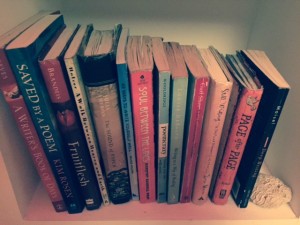
The writer Flannery O’Connor famously said, “If you survived childhood then you have plenty to write about.” Whilst this may very well be true it’s easier said than done to conjure up enough material to keep up the habit of writing a journal. Most people abandon journals with seven days of starting. This may well have been the case with the mother of writer Terry Tempest Williams who gifted her daughter her journals and asked her to promise not to look into the journals until after her death. When her daughter leafed through the three shelves of cloth bound journals every single one of the journals was blank.
The new-year is an ideal time of the year to start a new journal. But most people hesitate because they’re not sure how or where to start, what to should write about and how to keep going.
Over 26 years of writing a journal what has kept me going and got me back on track when I have fallen off the wagon were the book mentors in my collections of books on journaling and creative writing. These are books steeped in the art of journaling or creative writing. I have never felt alone on the journey of journaling as one or more of these books have always been close to hand to dip into for inspiration, ideas and motivation to stay on the page.
With proven physical, psychological and emotional benefits of journal writing being evidenced significantly in recent research giving a gift of a blank journal makes holistic sense. Especially if you want to give someone a gift with personal meaning then a blank journal or notebook with one of my recommended journal writing books from the list below as a companion makes perfect sense.
Starting from left to right:
A Writers Book Of Days, Judy Reeves
Whoever receives this as a gift won’t ever be stuck for something to write about. Reeves, ploughs you with hundreds of writing prompts to keep you going for the year. I love all the quotes about the idiosyncrasies of writers and how they write. The layout is spacious with text that’s easy to read.
Saved By A Poem, Kim Rosen
If you want some fresh or new ideas for writing in your journal then you won’t be disappointed with Saved By A Poem. It’s all about the heart and soul of poetry and how to use a poem to learn about yourself and life. Reading this book inspired me to start learning poems again off by heart. It brings home how poems can connects us to those emotions and feelings we may have difficulty in expressing. This one is ideal for teenagers, someone facing adversity or when you’re feeling adrift in your life or career. There’s a CD that comes with the book of all the featured poems.
Poem Crazy, Susan Goldsmith Wooldridge
I never tire of reading Poem Crazy. Each essay is a deep dive into the wonderful mysterious force of nature that poetry bestows upon us. But it’s not airy-fairy text as each essay features real life situations from the authors work as a poetry teacher. In fact it’s very moving when you realise how deeply poetry can touch and move people and groups whom others have often given up on. This is a playful, fun book, which is also full of surprises. I think reading an essay a day from Poem Crazy will get you to the page and keep you there. The prompts are not what you would expect which keeps the whole process stimulating. I’ve read my copy several times over now and I’m never bored by the content. This one is great gift for a teenager who maybe finding it hard to vocalize experiences and feelings.
Fruitflesh, Gayle Brandeis
The succulent pomegranate on the front of this book was what originally drew me to buying it. But I was bowled away by the richness and juicy writing prompts that focus on writing prompts inspired to get women writing about their bodies. Brandeis writing prompts are refreshingly appetising, savoury and short but yet deep and reflective. Whether you write or not every woman should have a copy of Fruitflesh. Unfortunately someone in marketing made a startling choice and changed the book cover design which I am sure has had an impact on sales of the book.
A Walk Between Heaven and Earth, Burghild Nina Holzer
Don’t be fooled by the slimness of this book. It’s a years worth of journaling by creative writing teacher Burghild Holzer. This is a great companion for someone new to journaling. Holzer shares a year of writing in her journal around the time of her brother dying. It’s an ideal companion to a journal for someone who maybe experiencing grief or loss.
The Sound of Paper, Julia Cameron
I have read every non-fiction book by Julia Cameron and I like them all but the Sound of Paper is one of my favourites. I love the image on the cover and the chunky feel of the book. The essays are beautifully crafted using metaphors of the earth to illustrate the contours of the writing life. I found the essays in The Sound Of Paper meditative and they really inspired me to write more sensually and connect to the senses in my writing.
49 Ways To Write Yourself Well, Jackee Holder
It’s an easy to read illustrated guide to journaling and therapeutic writing. It helps you get started with journaling and offers loads of journal writing prompts. It includes writing exercises to deal with everyday life challenges as well as ideas for becoming a better writer.
Soul Between The Lines, Dorothy Randall Gray
This is one of my favourites. The book is well structured and crafted and the author comes up with some gems for writing a journal and for developing writing practice in your journals. I like the practices of finding “seeds” and the “food for thoughts” in early writing drafts. Come on publishers you need to bring this book back into print. You can still find second hand copies on line.
Writing As A Way Of Healing, Louise de Salvo
This book is a more serious take on the expressive and therapeutic benefits of journal writing and is best suited for those needing to work with emotional and psychological material. It is evidenced based so draws on research and case studies. I like this one a lot and have returned to it many times as research for articles and writing projects. This is a great writing book to gift to a friend or family member who works in the caring or helping professions or someone who is going through a difficult time.
One Continuous Mistake, Gail Sher
This is another slim volume but not to be underestimated. Sher an ordained Buddhist minister has pulled together a volume of Zen like essays on the writing habit. A strong message throughout the book is the reminder that we can learn a great deal from our mistakes. I have been sharing her four noble truths for years with writers on writing retreats and they really resonate with people. This book is both spiritual and sacred. I wrote loads of quotes from this one and kept stopping to follow up references.
Still Writing, Dani Shapiro
This is a new edition to my collection which I read earlier this year and spent most of the time either laughing out loud or nodding my head in agreement. If you know someone who is struggling with believing in themselves as a writer than Shapiro’s down to earth story telling about becoming a writer will kick you up the butt and hopefully onto the page. This book teaches you about writing and life. I loved it, tweeted it and she conversed with me on Twitter. Not bad for a best selling author who’s been featured on Super Soul Sundays with Oprah.
Page By Page, Heather Sellers
I couldn’t believe my luck when I stumbled across Page by Page. Newly in print in 2009 I felt like I had found a new friend. This is a hearty book. It won’t allow you to get off the page. It breaks down the writing process in an easy to follow, friendly way that you leaves you not feeling intimidated by the writing process, I promise you. It’s one of those guides that you know and feel it through the writing that the author has walked her talk. Heather is an experienced writing teacher to writers and it shows. Great book gift for someone who wants to write but hasn’t started.
Deep Writing, Eric Maisel
I really like Eric’s work and his books are always well researched and thought through. Deep writing should get a lot more attention than I think it does. It’s great for those who want to take their writing more seriously and beyond the pages of the journal or seasoned writers who might be feeling stuck. But equally it’s a great guide and companion for deepening into your own journal writing and writing well about the things that are meaningful in life.
1 Comment
Monday, November 17th, 2014
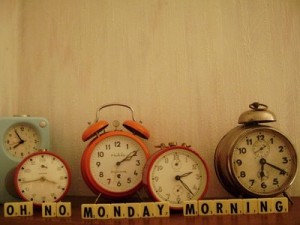
It’s Monday morning and pouring with rain in London town but for a huge majority of the nation Monday mornings feel the same whether it’s raining or not.
One way of getting focus and a dose of free divine guidance tohelp with problems or challenges that might be bothering you on a Monday morning is to indulge in a bit of creative online oracle reading.
I have a collection of card decks that I use for writing inspiration and for help and insights into life’s every day challenges or problems. But decks are not easy to carry around so increasingly I’ve been going online for some of that guidance.
Now I know that for some people the word oracle brings to mind a psychic reading with an older woman in a shawl looking into a crystal ball (well I know in the past it has done for me). Good news is that oracle readings have caught up with modern day technology and brings a fresh new approach to readings making them more accessible, easy to read and understand for yourself. These readings put you n the driving seat.
Instant readings on line can be especially useful when you don’t have access to a coach or mentor, a trusted friend or listening ear, when you want to keep an issue or problem private or you want some new perspectives on an ongoing issue.
Here’s three of my favourites online oracle readings and guess what they’re all free!
Instant Guidance
Rebecca Campbell’s offers one of the best instant guidance readings on line. Always insightful and to the point I like the positive energy and down to earthiness of her readings.
I know Rebecca personally and know that each of her readings have been channeled through her (and they feel like I whenever I hit the button) often as she wanders through Regents Park a stone throws from where she lives in central London.
How it works
- Think about something you need a little bit of guidance with.
- Close your eyes and click on the button for your instant hit.
- You’ll receive an insightful message and guidance that I always find spot on.
Click here for more information about Rebecca Campbell Instant Guidance Readings
A Touch Of Grace
Next on my list for your free online oracle reading is Cheryl Richardson’s Grace cards readings. I first owned the Grace cards as a deck of cards but enjoy the immediacy of having instant access to an online reading even when I’m on the move.
Accessing the cards appear on Richardson’s website in the form of twinkling stars.
You’re guided to click on the Begin logo to receive a divine message.
How it works
- When you’re ready close your eyes and think of a challenge you’re currently facing.
- Then open your eyes and click on the twinkling star that calls to you.
- A card appears with an image and a word.
- You are then invited to contemplate on the word.
- Next click on the card and it will show you a message on the other side of the card.
Click here to find out more about Cheryl Richardson
3 Card Oracle Reading
My final online card reading comes from the Enlightenment pack (another deck in my collection) created by US psychologist Chuck Spezzano.
Click here to link to the 3-card reading on the astrologer Pam Carruthers website
Click here to visit the Psychology of Vision website
How it works
- To begin, think of a current problem (and if you don’t have any problems then think of something you’d like to improve in your life). Or choose a problem you’d like to clear, if not entirely then at least the next layer of it.
- Three cards will appear.
- Pick a card from the first selection, which identifies what the block is. The second card identifies the gift and the third card the healing.
I like the fact that there is an in-depth explanation of each of the cards along with questions and prompts to explore the theme and issue in more depth. You will definitely need pen or paper to hand or copy and paste the text for each of the cards.
These cards take you on an inner journey when you welcome a deeper psychological and spiritual exploration of your issue.
So there you go. You don’t have to have the Monday morning blues with all this instant guidance at your fingertips. So don’t let your problems eat away at you. There’s plenty of inspiration and guidance out there and plenty of it’s available for free.
Have yourselves a great week.
No Comments
Thursday, September 11th, 2014
I am really delighted to welcome our guest blog presenter Nathan Ohren founder of Write4Life of and the wonderful JournalTalk podcast. We’ve had some great conversations over the last year about our preferences of either journal writing by hand or digitally. Read Nathan’s story of when he realised he had to do something with all the handwritten journals he’d accumulated over the years and how he is bringing life to the benefits a digital journaling practice offers.

Last spring, while reorganizing my garage, I pulled out all of my hand-written journal notebooks from their dusty storage bins, and gazed in amazement.
Nearly thirty years of scratching, yearning, planning, celebrating, and plain-old-venting, lay sitting before my eyes. Over the next few weeks, I found myself selecting a random volume, letting the spirit of the young boy who wrote on these pages lead me to a random page, and reading whatever story was there. Sometimes a fretful worry, or a lustful longing for someone’s affection, other times a meticulous weighing of strategic options in preparation for making a clear choice in life’s path.
For nearly a month, the colorful stacks of journals, sprawled out on my living room floor, brought me gifts of sentimentality and nostalgia. Yet they also breathed some refreshing new life into my present set of chances and challenges. Notebooks large and small, some with faded ink and crispy, yellowing pages, cried out for my remembrance: Yes, you can do whatever you put your mind to. Look at all that you’ve done. Look what you’ve been through.
I eventually became overwhelmed by the volumes of tragedies and triumphs, and threatened to put them back where they belonged. But they beckoned me to read more. And reminded me how futile their existence if only to be boxed away and forgotten. And so we arrived at this interesting compromise. I committed to an important endeavor to free them from solitude and seal their freshness for hundreds of new-coming years. I promised to scan them into PDF format.
I started to digitize my journal collection.
A costly and painstaking project, which I have outlined in this podcast. There were no shortcuts, and several challenges, including some “trust issues” that I never knew I had! And today, I feel a kinship and a peace with my journals that I’ve never known before. May they live now, even beyond my stewardship, into who-knows-what-distant-future these stories may still offer inspiration.
The experience has caused me to consider, for the first time in 30 years, a new habit of journal-writing. I’ve begun a digital journal. And it’s much like learning to write all over again, just like a child, pushing out a sentence or two with a clumsy, chopstick-like tool. But the benefits are many. And it’s getting easier every day.
I’m not going to use this article to convince you why digital journaling is better than handwriting, because the jury is still out on that. Instead, I’m here to announce that there’s never been a better time to give typing your journal a try. The 30-Day Digital Journaling Challenge is starting October 1st, and promises the best tips and resources available on the web on the subject.
We’ve pulled together some of the world’s best journaling coaches and writing therapists, people who just have a knack for helping you pull the best stories out of your heart and mind. Poetry therapists from New York, graduates from the Therapeutic Writing Institute, and your very own Jackee Holder, are some of the featured experts during the 30-Day Digital Journaling Challenge.
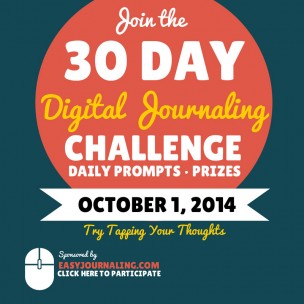
The Challenge is FREE, starts October 1st, and when you register for the event here, this is what you can expect:
- A welcome kit with some tips and reminders for starting a successful journaling habit.
- Recommendations on the most popular journaling apps to use for your unique interests.
- Email newsletters (each day for 30 days) with colorful journaling prompts to inspire your best writing.
- Free downloads and links to popular books and additional resources for journaling.
- A community of others who are in the Challenge, sharing “Aha” moments and experiences in electronic journaling.
- Did I mention there were daily prizes for participation?
And the whole thing — all of the above — is totally FREE.
There’s no prerequisite, and it’s not a competition. This is just a fun way to get more people to create a habit of journal-writing with some modern digital writing tools. Hope to see you there!
I’m one of the seventeen sponsors so really looking forward to having you join which I know will be a great 30-Day Digital Journaling Challenge.

Nathan Ohren has been writing for personal growth nearly 30 years. Host of JournalTalk, a free weekly podcast featuring benefits and techniques of journal-writing, Nathan interviews health professionals, educators, business owners, and plain-ordinary-people. Nathan is a Certified Journal Instructor with the Center for Journal Therapy, an active member of the International Association for Journal Writing, and recently published “The Journal-Writer’s Guide to Staying Started”
2 Comments
Friday, August 29th, 2014
Since I was a little girl I have always found comfort and refuge in words, whether these were my own words or the words of someone else. Recently a dear friend reminded me that in primary school I would write deep, meaningful poems- a memory I had long forgotten about. At that age, I was deeply wounded and feeling very alone. The poems were my way of revealing the hurts I could not speak aloud.
I have been journaling for over 25 years – a practice which has helped me navigate my way through a serious trauma in childhood, domestic violence, depression and debilitating low self-esteem. Journal writing has enabled me to see life in a new way – not to sleepwalk through life but to see life more clearly. Journal writing has literally saved my life.
The blank page is an invitation to write the truth about our lives no matter how difficult and messy that might be. It’s a safe place to reveal and explore our truths and the rawness of our emotions. It is a place of growth and healing. Jessamyn West said, “People who keep journals experience life twice.”
Sexy, Sacred Journal Writing is a six-week online course that shows you how journal writing is a restorative practice that you will help you become more of who you truly are.
Why sexy, why sacred?
I have always believed that in a pure sense the the meaning of the word sexy does not refer to sex in a dirty way but to a woman or a man who appreciates the divinity and gloriousness of their bodies from the inside out and who is not afraid to allow that to show.
Sexy is the way I feel about journal writing. It’s a space where I can unravel myself and write myself to wholeness, which allows a connection of feeling good that travels from the inside to the outside. When you write in a journal you know about it, you feel it, other people feel it and sense it and I believe we not only feel act better but we feel better.
Sacred is a feeling I often connect with when I have deepened into the practice of writing and creating in my journal. Whether it is evolving a feeling of gratitude at the end of several pages of completing or moaning or as a result of writing and gaining an insight or understanding that has stopped me in my tracks and causes me to breathe deeply in the space that has opened up in the moment.
The bringing together of the word sexy and the word sacred remind us that all moments in life hold the possibility of transformation, healing and enlightenment. It was hard to use the word sexy in the title of this course, but I stand by it. I hope you will too.
What is this course really about?
- This course is also about smelling the roses and savouring the small delights and moments in daily life.
- Its an invitation to open up to how you can make your day more meaningful through writing and journaling about what you see, observe, hear and intuit.
- It about connecting to things, people and activities that bring you joy, satisfaction and fulfillment.
- Sometimes journal writing can be a very isolated practice triggering feelings of loneliness. Learn how aware journal writing can transform loneliness to appreciating the gifts that aloneness gives you.
- The journey of Sexy, Sacred Journal writing is the journey from suffering to surviving and how to move to a place of thriving.
- This course will help you find your voice and also how to use your voice both on and off the page.
- Identify in times of darkness and challenge where the light gets in and how to use this light as a guide to your way through.
So what do get by joining Sexy, Sacred Journal Writing?
- You walk away with a succulent range of journal writing techniques and habits (you choose what works for you)
- You’ll learn from seasoned writers and women just like you about their personal journeys and relationships with their journals and relationship through nine video inner-views with our journal-writing experts.
- You’ll leave with an illuminated and informed understanding of how journal writing is both a restorative practice, a form of self-enquiry and self revelation and how it is a new and emerging therapy Jackee has created called, “Paper Therapy” more here
- You’ll gain insight and perspective from your journal writing entries that will help you to grow and become a better and more enlightened person.
- I will be active in the discussion forums where you can share your experiences and responses to ach of the different lessons, ask questions, talk through challenges and any resistances you might be experiencing. How much you engage with on the forum is up to you. I’ve been a participant on online courses where I have greatly benefitted from being active on the discussion forums and then other times when absence and silence was absolutely what was required. Use the discussion forum in the way that works best for you.
How will you know whether Sexy, Scared Journal Writing is right for you?
- Are there things in your life you find difficult to talk about and share with others?
- Have you tried journaling before but found that it made you feel worse rather than better?
- Do you feel that you have lost your touch and your sense of yourself in your relationship, your job or your career?
- Have you lost sight of what makes you uniquely you?
- Would you like to know that you have generated a body of work that records who you have been, where you have come from and a written testimony of what you have come through?
- Would you like to know about the scientific research that confirms how writing and keeping a journal helps with managing change and transforming our lives?
How the Course Works
The course consists of three weekly lessons for six weeks as well as weekly video inner views from our delightful community of journal writers.
Register
The course begins on Monday 5th January 2015 and you can register online now.
Please get in touch with any questions
Course Fee
Exclusive Festive 2-4-1 Offer of £57 ends on 29 December 2014
Early bird offer of £57 per person from 30 December until 2nd January 2015
Standard Registration after 3rd January 2015 will be £79 per person
1 Comment
Wednesday, August 20th, 2014
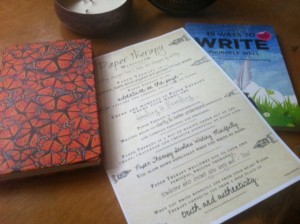
(Quotes in brackets form part of The Paper Therapy Manifesto 2014).
A Manifesto is a personal declaration based on a belief or something that you strongly stand for or advocate
I’ve always been a bit of a writing geek. At secondary school I went to great lengths to design fabulous cover for my history projects as well as illustrating all my content, which always earned me straight A’s in the subject.
In the last few years much of that passion has resurfaced in the creation of a series of manifestos. Manifestos help me to get to the roots of why a particular practice or activity is of value. Then by turning it into a manifesto it becomes a powerful written reminder of why the topic of your manifesto matters. That’s why Paper Therapy has become the fourth in my series of Manifestos. The first three were: The Writing Manifesto, The Creativity Manifesto and The Nature Manifesto, which you can download for free by clicking on the links.
The new hot off the press Paper therapy Manifesto is a call to the magnetic practice of journal writing based on my belief that (Writing changes lives and lives are changed by writing).
I’ve been journal writing for over 26 years. I started writing regularly in a journal a year or so before my daughter Aida was born. Over the years journal writing has helped me through various bouts of depression, a serious broken heart, a meltdown around my career, financial hardship and the high’s and lows, swings and roundabouts of daily living (Paper Therapy is Transformative. Writing helps to clarify and better understand difficult feelings and emotions).
The practice of journal writing has become both a daily ritual and a place where the quiet practice of journal writing returns me every time quietly to myself. It’s where I get to express myself, to hear and listen to my inner voice and not get carried away by the hustle and bustle of the world around me (There are moments in Paper Therapy when your words are healing and revealing).
What I appreciate about the practice of Paper Therapy which journal writing is part of is that (Paper Therapy is inexpensive, doable almost anywhere and you have 24 hour access). I like the fact that it’s possible to engage in paper therapy almost anywhere, from the top of the 37 bus, at the wheel of my car, in a park under a tree, in a corner in a busy café or scribbling in the dark of the local cinema screen
I find the regular practice of journal writing both therapeutic and calming. It takes me out of the roller coaster world of the busy mind and transports me into the world of quiet mind in minutes (Paper therapy involves writing mindfully. You slow down especially when you write by hand).
Sometimes I write loads in my journal, flushing out all the toxins and negativity from my day. On other days it’s just a sentence or two to remind that I’m still here. Most of the time because of it becoming a practice the page is alight with ideas, musings, seeds of thoughts and possibilities about life and work (When you write honestly and from your heart Paper Therapy connects yourself and others from a deep place of truth and authenticity).
In my world Paper Therapy embraces the ordinariness of life, sharpening the quality of my awareness and presence
(Paper Therapy is an adventure on the page – Explore and unravel your life on the page). In-between jottings of deep reflective thoughts and inquiry you’re just as likely to stumble across a shopping list with items like cod and potatoes. The sacred and the routine sit side by side.
There’s no showing off or points to prove in the journal (what’s the point), only showing up. We get to show up, as we are. If we’re brave enough and honest enough, we show up sometimes naked, without the buffing up, the job title or choosing the option of hiding behind material possessions. Instead it becomes just you and the blank page, (Paper Therapy welcomes you to your own personal writing therapist, someone who knows you very well).
The writer Flannery O’Connor said, “If we survived childhood then we have enough material to last a lifetime.” Put this together with some wise words from Ernest Hemingway, “ The world breaks everyone and afterwards many are strong at the broken places,” so the fact that you’re alive means you have enough material to write about in your journal or notebook to last you a lifetime.
In a recent blog post for the entheos academy author Mozart Gurrier shared an example about children in a homeless centre where the facilitator sets a chimer for three minutes and gets them to write. Read more here
This is a brilliant example of where an organization has embraced the practice of #papertherapy.
- Think about what and how our schools would be different if students were given 7 minutes at the start of the school day to getting their feelings down either digitally or on paper in a session rightly named #PaperTherapy.
- How much more and aware and in tune would our teaching staff be all round if permitted to do the same?
- Think about the conflicts, the bullying and harassment that would be eradicated workplaces if people learnt the rules of engagement with the blank page that showed them how to take ownership of their own emotions and feelings (Paper Therapy is a way of making order out of the chaos and challenge of everyday life).
They would learn how not to spill and leak emotions all over the place a point eloquently illustrated by the writer Alexandra Johnson in her book, Leaving A Trace: On Keeping A Journal. Alexandra shares some of the possible pitfalls for those not used to keeping a journal when she writes “Trust that the bore bending your ear on the plane or the ranting taxi driver on the ride home never kept a journal. That egotism leaks out publicly instead. You become their journal, a live blank page, held hostage in a seat. Think of journals as a safe, private way to have it siphoned off, rethought, vented … “
- Think about how much money and pain would be saved in divorce settlements and child custody cases if parents and families learnt how to make paper therapy a way of family life?
- Prescriptions for anti-depressants in the UK has increased by 495 percent since 1991 (Huffington, 2013). What if GP’s handed out paper therapy prescriptions instead of tranquillizers or encouraged patients to put pen to paper? And what if Dr’s self -prescribed some of the same paper therapy as they prescribed to their patients?
- What if healing and restorative poems from across the ages and modern times were available free of charge on the NHS? Numerous research is indicating that reading poetry creates new neural pathways in the brain.
Paper therapy works for me however it doesn’t make my life perfect. I still have to deal with messy stuff like everyone else does. I make mistakes, get things wrong and piss people off! But perhaps this quote from the book, The Pen and The Bell: Mindful Writing In A Busy World will give you a better understanding of how journal writing has contributed to me becoming a much better person in my life than the person I would have been had I not embraced it as a practice.
Writer Kim Stafford likens writing to playing the violin. He says that a violin played everyday will keep the vibration of the music in its body, even while lying still and silent. If it is not played everyday the vibrations dissipate and the wood grows lifeless.” Journal writing gives my life vibration.
The other aspect of journal writing I wholeheartedly appreciate right down to the bones about it as a practice and a way of life is how I have grown to love fiercely the woman who has inhabited the thousands of pages of journals and notebooks that I’ve filled.
My Paper therapy journey has been like a seed planted in the earth. Every word, every paragraph and every line has been turned over and mulched into the fabric of my daily life. The pages of my journal have been the earth and the soil in which I have grown. Each journal from cover to cover has watered my life. Nothing I’ve written has been wasted.
When I don’t write regularly, when writing is not at the core of my life it feels as if I’m skimming over the surface of life. When I write often and regularly I’m noticing how my hunger for the things in life that are addictive and unhealthy is greatly reduced. My digestion of everyday experiences is clearer and more of a felt and lived experience when I write.
Through the paper therapy journey I’ve grown to accept and not reject the woman I have blossomed into warts and all.
Welcome to #papertherapy. Let the writing and the inside out change process begin. I want to be part of a revolution on the page knowing that (writing changes lives and lives are changed by writing). Will you join me?
Download your free copies of the Paper Therapy Manifesto 2014 here:
If you are inspired please feel free to spread the word and share the love.
With Love,
Jackee
No Comments

